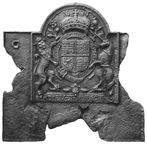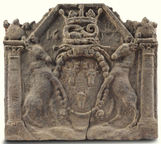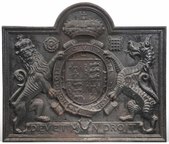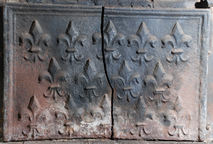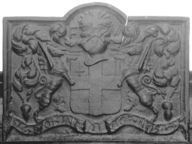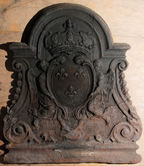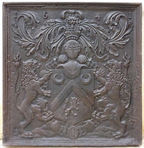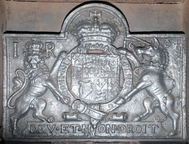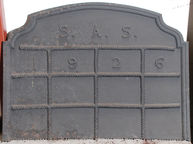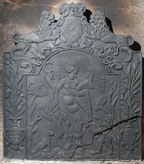-
224
Description: Composite; Arched rectangular shaped, armorial fireback, cavetto edging, with Stuart Royal arms, garter, supporters, crown and motto, and 1639 date above crown; this overlies a rectangular plate, with rope-effect, fillet edging; a pattern of four rosettes surrounding a fleur-de-lys, its stem terminating in a small buckle, is repeated on each side of the central armorial fireback, with the initials above; each rosette is stamped separately.
Notes: The armorial may originally have been one of the 1619 series. Formerly at Wonastow Court, Momouthshire
Inscription: 1639 / G / HONI SOIT QVI MAL Y PENSE / DIEV ET MO DROIT
Arms: English Stuart royal
- Decoration tags:
- rectangular with round arch (shape)
- fillet (edging)
- whole carved pattern
- composite
- individual letters
- armorial
- text
Manufactured: in 1639 possibly in the Forest of Dean area of England.
Current location: National History Museum, St Fagans, Glamorgan, Wales.
Museum number: 40.428 (part of the Welsh National History Museum museum group)
-
246
Description: Quasi-arched rectangular shape; on a ground, an armorial achievement comprising a central cartouche on which is an oval shield bearing the arms of the Cavendish family, with graduated bead edging; supporters, two stags rampant; above the cartouche, on a wreath a coiled snake crest surmounted by an earl’s coronet; the date split either side of the crest; to each side, a column with foliate capital supporting a three-sided arch with ovolo-moulded edging, on each shoulder of which is a flaming orb.
Notes: The arms are those of William Cavendish, 3rd Earl of Devonshire (1617-84). Sotheby's auction, The Chatsworth Attic Sale, 7 Oct 2010, lot 3 (£18,750).
Inscription: 1657
Arms: William Cavendish, 3rd Earl of Devonshire
- Decoration tags:
- rectangular with three-facetted arch (shape)
- complex individual (edging)
- whole carved pattern
- individual numbers
- armorial
- text
Manufactured: in 1657 in England.
Current location: not known.
- Attached to series:
- Personal armorial firebacks
- Cavendish arms series
-
319
Description: Arched rectangular shape; cyma-reversa edging; Tudor royal shield, garter, crown, motto and supporters (crowned lion and dragon); Tudor rose to right of lion’s head, portcullis to left of dragon’s head; temp. Elizabeth I.
Notes: This a replica cast from a modern pattern by Thomas Elsley Ltd. of London in imitation of a Tudor original.
Copies of this fireback are known.
Inscription: [Garter] HONI SOIT QVI MAL Y PENSE / [motto] DIEV ET MON DROIT.
Arms: Tudor royal - Elizabeth I
- Decoration tags:
- rectangular with round arch (shape)
- cyma reversa/ogee (edging)
- whole carved pattern
- armorial
- royal
- text
Manufactured: in the late-19th to early-20th century at Portland Metal Works, Great Titchfield Street in the London area of England.
Current location: not known.
- Attached to series:
- Tudor royal armorial firebacks
-
75
Description: Rectangular; ovolo moulded edging (top and sides); 14 impressions of a fleur de lys, arranged in three horizontal rows (5-4-5), carefully spaced.
Notes: The same fleur de lys stamp has been noted on several firebacks, indicating a common source.
- Decoration tags:
- rectangular (shape)
- ovolo (edging)
- carved stamps
- heraldic
Manufactured: in the mid- to late-16th century possibly at Pounsley Furnace, Framfield in the Weald area of England.
Current location: in private hands, Groombridge, East Sussex, England.
- Attached to series:
- Pounsley series
-
146
Description: Arched rectangular shape; cavetto moulded edging; shield, helm, crest, supporters, mantling and motto of the Corporation of the City of London; initials split by crest; date split at ends of motto.
Notes: Shield: Argent, a cross gules, in the first quarter a sword in pale point upwards of the last; crest: on a wreath argent and gules a dragon's sinister wing argent, charged on the underside with a cross throughout gules; supporters: on either side a dragon argent charged on the undersides of the wings with a cross throughout gules; motto: Domine Dirige Nos - Lord Direct Us; the earliest illustration of the arms in this form was in 1609, but their use is older. Formerly part of the Ade Collection (from Grove Hill, Hellingly, Sussex). Inferior copies of this fireback were advertised in Kings Worthy Foundry's (Winchester) catalogue in the mid-20th century.
Copies of this fireback are known.
Inscription: F W / 16 DOMINE DIRIGE NOS 59
Arms: Corporation of the City of London
- Decoration tags:
- rectangular with round arch (shape)
- cavetto (edging)
- whole carved pattern
- individual letters
- armorial
- text
Manufactured: in 1659 possibly in the Weald area of England.
Current location: Hastings Museum and Art Gallery, John's Place, Bohemia Road, Hastings, East Sussex, England.
Museum number: HASMG: 1952.51.53 (part of the Hastings Museum museum group)
- Attached to series:
- Civic firebacks
-
940
Description: Upon a rectangular base plinth, wide scrolled side fillets with foliage about the scrolls and suspended bell flowers in chain above; central oval shield bearing three fleurs-de-lys supported by an angel on each side, and surmounted by a French royal crown; on top, an arch rising from horizontal moulding on each side.
Notes: Characteristic of designs illustrated by architects such as Daniel Marot.
Arms: France Royal
- Decoration tags:
- rectangular with round arch (shape)
- complex individual (edging)
- whole carved pattern
- planklines
- armorial
- royal
Manufactured: in the late-17th to early-18th century in France.
Current location: not known.
- Attached to series:
- Foreign armorial firebacks
-
1014
Description: Rectangular with moulded edging; shield, forward-facing helm, lion's head crest, mantling, lion supporters, and collar of the Order of St Michael
Notes: The arms are probably those of Jean Bouchu (1597-1653), French parliamentarian: azure, a chevron between, in chief, two crescents and, in base, a lion rampant sinister or.
Inscription: 1641
Arms: Bouchu
- Decoration tags:
- rectangular (shape)
- complex individual (edging)
- whole carved pattern
- armorial
- text
Manufactured: in 1641 in France.
Current location: Claude Augustin Antique Materials, 104 Route Nationale 6, 69380 Les Chères, Rhone, France.
- Attached to series:
- Foreign armorial firebacks
-
360
Description: Arched rectangular shape; ovolo edging; Stuart royal arms of England (quarterly, 1st and 4th, France and England, 2nd Scotland and 3rd Ireland) with garter, crown, motto and supporters; initials either side of lion’s head; date either side of unicorn’s head.
Notes: The slightly awkward positioning of the date suggests it was added later. Copies were advertised in the Carron Company's catalogue.
Copies of this fireback are known.
Inscription: I R [Iacobus Rex] 16 04 / DEV ET MON DROIT
Arms: English Stuart royal - James I
- Decoration tags:
- rectangular with round arch (shape)
- cavetto (edging)
- whole carved pattern
- individual numbers
- armorial
- royal
- text
Manufactured: in 1604 possibly in the Weald area of England.
Current location: Scotney Castle, Lamberhurst, Kent, England.
Museum number: 791456 (part of the National Trust museum group)
- Attached to series:
- Jacobean royal armorial firebacks
- Stuart royal armorial firebacks
-
440
Description: Rectangle joined to low arch with cyma recta curves; ovolo-moulded edging (top and sides); grid of twelve rectangles (4 columns of 3) with twisted rope borders; initials in arch, date in top line of rectangles.
Notes: A fireback cast specially to mark the 60th anniversary of the Sussex Archaeological Society, and donated to the society by Mr John Every.
Inscription: S.A.S. / 1926
- Decoration tags:
- rectangular with canted top corners and round arch (shape)
- ovolo (edging)
- simple stamps
- individual letters
- individual numbers
- text
- objects
Manufactured: in 1926 at Phoenix Foundry, Lewes in the Weald area of England.
Current location: Anne of Cleves House, Southover High Street, Lewes, East Sussex, England.
Museum number: 1944.24.093 (part of the Sussex Archaeological Society museum group)
- Attached to series:
- Miscellaneous stamp firebacks
-
701
Description: Arched, rectangular central panel with fillet edging; figure of Abundance holding a sickle and a Horn of Plenty, a child, also holding a sickle, to the right, a seated dog to the left, framed by trees; fillet-edged border with a plant pot each side, lilies issuing therefrom; above an oval shield of arms, a grotesque face above, supported by two lions.
Notes: Abundance was one of many allegorical figures to feature in the Iconologia, first published by Cesare Ripa in 1593. The style of the fireback derives from those produced in the Siegenland of NW Germany for the Dutch market, but this example may be a pastiche produced for the French market.
Copies of this fireback are known.
- Decoration tags:
- 'Dutch' (shape)
- fillet (edging)
- whole carved pattern
- pictorial
- allegorical
- armorial
- animals
- humans
- plants
Manufactured: in the late-17th to early-18th century possibly in the Lorraine area of France.
Current location: Tiverton Castle, Tiverton, Devon, England.
- Attached to series:
- 'Dutch' Miscellaneous Firebacks
